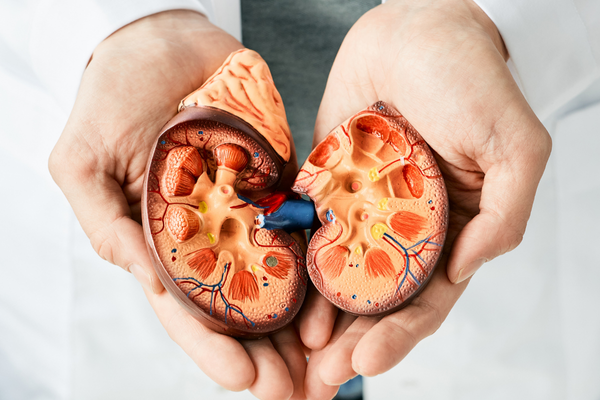Essential strategies to effectively protect your kidneys from disease and failure – By Dr Harold Gunatillake


“The prevalence of chronic kidney disease (CKD) in Sri Lanka is significant. In 2020, 164,000 individuals were diagnosed with CKD, highlighting a pressing health concern. Furthermore, research shows that around 10% of the population in Sri Lanka is affected by kidney-related conditions, underscoring the urgent need for attention to this issue”.
Many health-conscious individuals prioritise managing cholesterol levels and reducing the risk of heart disease. While these concerns are undoubtedly important for overall well-being, paying attention to kidney health is equally crucial. The kidneys filter waste products from the blood, regulate blood pressure, and maintain electrolyte balance. Neglecting kidney protection can lead to serious health issues, including chronic kidney disease, which can develop silently and progressively over time. Adopting a holistic approach that addresses heart health and the care and preservation of kidney function is essential to maintaining optimal health. This includes staying hydrated, consuming a balanced diet low in processed foods and high in fruits and vegetables, and taking responsibility for your health by monitoring blood pressure and blood sugar levels. This proactive approach can help prevent kidney issues and ensure overall well-being.
Lifestyle changes are crucial for maintaining your overall health and well-being. Regular health check-ups, including tests that evaluate kidney function, are a key part of this. Essential tests include measuring electrolytes, serum creatinine, blood urea levels, and the critical eGFR test, which assesses kidney function. Taking charge of your health and making these appointments a priority is a proactive step towards maintaining your well-being.
The eGFR test, which stands for estimated Glomerular Filtration Rate, is a crucial blood test that evaluates how effectively your kidneys filter waste products from your blood. It measures how your kidneys can remove creatinine, a waste product generated from muscle metabolism. This test is a crucial indicator of kidney function and is often used to detect chronic kidney disease (CKD) in its early stages. Understanding the significance of this test can empower you to take proactive steps towards your kidney health.
Medications that can harm the kidneys.
Medications that may potentially cause harm to renal function include Nonsteroidal Anti-Inflammatory Drugs (NSAIDs) such as ibuprofen, specific antibiotics (e.g., aminoglycosides), mood stabilizers such as lithium, certain antiviral agents, and the excessive use of laxatives, particularly over-the-counter varieties. These pharmaceuticals can induce renal damage by decreasing renal perfusion, eliciting hypersensitivity reactions, accumulating to toxic concentrations, or precipitating electrolyte disturbances and dehydration. It is imperative to seek medical advice prior to initiating any medication, especially in individuals with pre-existing renal impairments, as dosage modifications or alternative therapeutic options may be warranted.
Limit alcohol and avoid smoking.
Chronic kidney disease is a significant public health concern, with an estimated 37 million adults in the United States potentially affected. Alarmingly, nearly 90% of those with CKD are unaware of their condition, as it often progresses slowly and may not present noticeable symptoms in the early stages. When CKD is identified early through tests like the eGFR, individuals can take proactive steps to manage their health and slow the progression of kidney damage. This can include lifestyle changes such as adopting a healthier diet, controlling blood pressure and blood sugar levels, and avoiding medications that may further harm kidney function. Early intervention protects kidney health and improves overall quality of life.
A normal eGFR is greater than 90, but values as low as 60 are considered normal if there is no other evidence of kidney disease.
Having diabetes can cause early chronic kidney disease. You need to keep your blood sugar levels under control.
Controlling your Blood Pressure is as essential as controlling your blood sugar. High Blood Pressure can damage the kidneys by causing the blood vessels in the kidneys to become narrow and weak. This can reduce the blood supply to the kidneys, leading to kidney damage over time. Maintain a healthy BP through diet, exercise, and medication if necessary.
Maintaining a Healthy Weight is vital as obesity increases the risk of kidney disease. By aiming for a balanced diet and engaging in regular exercise, you can take proactive steps to maintain a healthy weight and reduce your risk of developing kidney disease. This commitment to your health can lead to improved overall well- being.
Eat a healthy diet. A diet low in salt, sugar, and unhealthy fats and high in fruits, vegetables, and whole grains can help.
Staying hydrated is very important. Drink plenty of water to keep your kidneys functioning properly.
Be cautious with Pain Medication- Over-the-counter pain relievers like NSAIDs can harm your kidneys if taken in high doses.
Conclusions: Chronic kidney disease (CKD) is a significant health concern, affecting 8% to 16% of people worldwide and
contributing to a high rate of mortality. To effectively manage CKD, it is essential to focus on several key strategies: reducing cardiovascular risk, treating albuminuria, avoiding potential nephrotoxins, and adjusting medication dosages as needed. By prioritising these areas, we can improve patient outcomes and enhance overall health for those impacted by this condition.
I hope this article helps raise your awareness about managing your kidney health.
End







